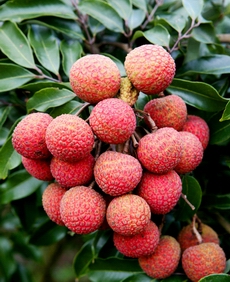 tion to being chock full of potent vitamins, minerals and other nutrients, lychee fruit can also help improve your workouts and make you lose more weight, studies have shown.
tion to being chock full of potent vitamins, minerals and other nutrients, lychee fruit can also help improve your workouts and make you lose more weight, studies have shown.Lychee is an Asian fruit covered with a rough, pinkish, leathery rind. Inside, the fruit consists of a translucent white, edible pulp that is juicy and sweet. Fresh fruits can be found in season at Asian and specialty supermarkets, or the fruit can be purchased canned, dried, or in the form of jams and sauces year-round.
Lychees are particularly high in antioxidants, including varieties that are known to help the body oxidize (metabolize) fat. Confirming the real-world benefits of the fruit, a recent study found that compared with people in a placebo group, people who took a lychee extract for two-and-a-half months but did not follow any diet or exercise plan experienced a significant decrease in weight and belly fat, and a significant increase in levels of a weight loss-promoting hormone.
Numerous studies have also suggested that lychee may increase endurance during exercise. While many researchers initially believed that this benefit comes from the fruit's high antioxidant content, a recent study, published in the Journal of Clinical Biochemistry and Nutrition in March 2012, cast this assumption into doubt.
Researchers from Seoul National University randomly assigned 70 regularly exercising men to receive either a lychee fruit extract, a mixture of vitamins C (800 mg) and E (320 IU), or a placebo for 30 days. The study was randomized and double-blind.
The researchers found that participants in the extract group showed a significant increase in both their anaerobic threshold and their suboptimal running time, whereas no such effect was seen in the antioxidant or placebo groups. This suggests, they noted, that the polyphenols contained in lychee fruit may increase endurance through an effect unrelated to their antioxidant (free radical-scavenging) activity.
A potent superfood
The benefits to lychee don't end with exercise and weight loss, however. At least two separate studies, conducted by researchers from Zhejiang Gonshang University and the West China Hospital at Sichuan University in China, have shown that lychee fruit helps prevent cancer cell growth. The fruit appears to contain flavonoids that are especially effective at suppressing breast cancer development.
Another polyphenol found in lychee, known as oligonol, is believed to act not just as an antioxidant but also as an anti-influenza agent. Studies suggest that it aids in weight loss, protects the skin from damaging ultraviolet radiation, and improves blood flow to the organs.
Nutritionally, lychee is a powerhouse. It contains exceptionally high levels of vitamin C, which is a potent antioxidant that helps the body fight disease (from colds to heart disease and cancer) and promotes healthy skin and bones. Lychee is also high in B vitamins that play essential roles in metabolism. Lychee is also high in copper, which is needed for red blood cell production, and potassium, which helps regulate electrolyte levels, blood pressure and heart rate in the body.
Lychee also contains phosphorus, calcium, magnesium, protein, and high amounts of fiber. It contains no cholesterol or saturated fat.
In traditional Chinese medicine, lychee is prized for its ability to reduce pain and shrink swollen glands. Natural medicine advocates also promote lychee for its ability to improve digestion and nutrient absorption. It is believed to support the adrenal gland, boost the immune system and improve skin health.





